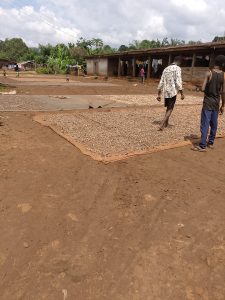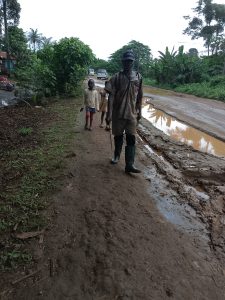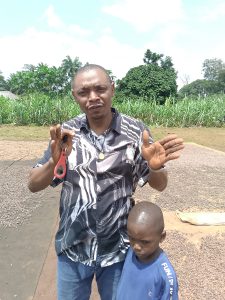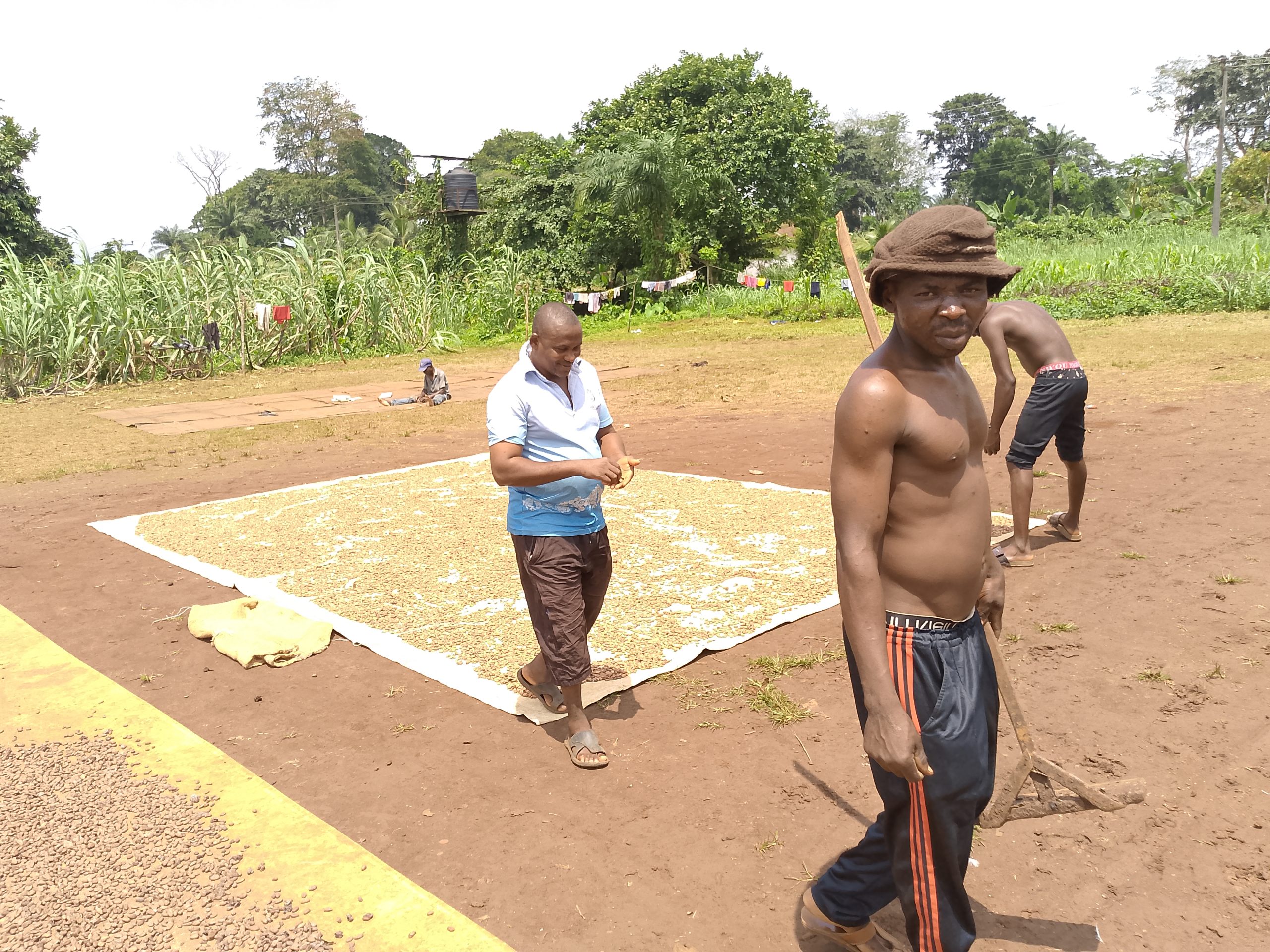THE postponement of the deadline for the enforcement of the
European Union Deforestation Regulation (EUDR) comes as a relief to
Nigeria and other affected countries. However, not a few cocoa
farmers in Nigeria are still in panic mode.
Had the European Union (EU) stuck to its deadline to enforce its European
Union Deforestation Regulation, EUDR, initially fixed for December 30,
2024, a deadly blow would have been dealt cocoa farmers in the country
who export the product.
Countries exporting cocoa, coffee, soya bean, oil palm, cattle, rubber and
wood to the EU member-nations had been gripped by fear following the
law, which was ratified by the European parliament in June last year.
In Nigeria, the authorities had come under intense pressure and criticisms
for being lackadaisical about meeting the conditions so that the products
exported by the country do not face rejection in the international market.
Letters of appeal were written to the EU Commission by the National
Cocoa Management Committee, NCMC and Cocoa Farmers Association of
Nigeria, CFAN on the need to review the regulations and shift the deadline.
This is even as the NCMC was given a mandate to rally stakeholders
towards ensuring that the European market, which takes about 80 per cent
of Nigeria’s cocoa, is not lost.
The frantic efforts culminated in the launching of a National Task-force by
Senator Abubakar Kyari, Minister of Agriculture and Food Security in Abuja
on October 8, 2024. However, six days before the launch in Abuja, the EU,
in a document signed on October 2, 2024, proposed a shift in the deadline.
Although it is yet to be formally ratified by the European Parliament, the
proposal which has been approved by the European Council comes as a
great relief to affected countries and their farmers, especially Nigeria.
The EUDR resolution
The EU had passed a resolution known as the European Union
Deforestation Regulation, EUDR, in June 2023, giving 18-month notice to
all countries exporting seven categories of agricultural produce to EU-
member nations that failure to address the issues of deforestation in the
farms, as well as undertake a survey of the land and the farmers would
attract a ban of the export of the affected commodities to Europe.
Farmers of the affected agricultural products-cattle, wood, oil palm, rubber,
soya, cocoa and coffee-majority of who were ignorant of the law,
particularly cocoa farmers, continued to work tirelessly to meet the
projection of the federal government on cocoa production by 2025.
The resolution, which was communicated to the authorities in Nigeria, as
was done for other affected countries, stipulated a deadline of December
31, 2024.
Before the happy turn of events, observing a seeming lack of concerted
approach by the federal government to deal with the matter, Bushlink had
traversed some states in Southern Nigeria to feel the pulse of farmers,
many of who expressed frustration towards the regulation. Interestingly,
many farmers were even unaware of the regulation that would have
seriously impacted their business and income, as they were planning
harvests in some cases.
For instance, mid-August, while the authorities in the country were in panic
that the EU was about to drop the hammer on the cocoa industry, Charles
Mgbe, a pastor and cocoa farmer in Ikom, Cross River State, oblivious of
the threat on his produce, was already making plans for the harvests at the
end of the year. The sales in previous years had brought celebrations to the
clan, and the signs this time looked even brighter. He was one of the cocoa
farmers in the area who were expecting to start the new year swimming in
cocoa money.
He said, “This is farming season, and farmers are spraying now for the
pods to come out so that by September, October, we will start harvesting.”
That excitement was driven by the development that saw Ikom, as a fast-
growing hub of the cocoa business in Cross River State, as a result of
which it had witnessed the proliferation of cocoa warehouses, and played
host to exporters even with over 20 of them locally based.

In view of the fortune in the trade, more and more young people were
getting involved, while the old farmers were happy making up for the losses
in the past years. Individuals, family and government farms were being
revived, while investors, both within Nigeria and abroad, opened shops in
Ikom to receive the crop, bag and export the product.
The same was the case in Bendeghe, in the Etung LGA, another cluster of
cocoa farming in the state. A lot of farmers went about drying cocoa beans
in the open without much knowledge about the threat from the EU, to ban
importation of their crops beginning from January 2025.
Umanah Umanah, a farmer from Akwa Ibom State, who said he worked for
a trader, expressed shock when he was told of the EU regulation. He
confessed to Bushlink that he had no prior knowledge of the threat.
In Delta State also, farmers were in the dark on what the EU regulation
means. Chief Tony Okofu, a cocoa farmer in Nsukwa, Aniocha South LGA,
who has a 30-hectare farmland, said though he had read it in the
newspapers, he did not understand the import of the EU’s regulation.
He said, “I read it, but didn’t understand what it meant. I read something
about deforestation and that they are not going to buy from countries not
keeping the rules. I didn’t understand it until you just spoke about it now.
I don’t know the number of trees that they think should not be in a farm. “You
have seen trees in my farm. I don’t know what they (EU) actually want.”

Even though cocoa is not considered a major export crop in Delta State,
Mrs. Florence Amukwa, head of the Nigeria Export Promotion Council,
NEPC, in the state, said her council tries its best possible to sensitise
farmers on the right thing to do before they could export their products.
She said, “We also go to them to see what they are doing on their farms. At
times we invite experts who also give them knowledge on how they should
go about it.”
Though there is an appreciable investment in cocoa, the agricultural
products known for export in the state are cassava, oil palm and, to some
extent, rubber. The contribution of Delta state to exportation of cocoa and
rubber has dropped significantly over the years. Bushlink found out that
many rubber plantations that previously dotted the central senatorial zone
are giving way to residential habitations and food crop farms. Cassava,
used in processing garri, is a staple food in the state that has joined export
crops and its by-products are exported. Though rubber fetched Nigeria a
whopping $84 million dollars in 2022, while Nigeria is ranked 18 th exporter
of rubber in the world, the product lost its prime place as Nigeria’s 4 th most
valuable export in the 1960s and early 1970s to occupy the 22 nd position
among export products in the country in 2023. In the case of cocoa, even at
the national level, the highest production volume is said to be at 350,000
tonnes, the volume produced in the 1970s by the country. Nigeria’s ranking
in cocoa has also dropped to the sixth in the world. But now that things are,
once again, looking up for stakeholders in the cocoa industry, there is the
likelihood that more people will begin to take interest in it, as it happens in
other cocoa producing states.
With increasing gains from the exportation of cash crops in the state,
particularly oil palm, individuals and corporate farmers have continued to
expand plantations into forest reserves, and this has given both the Ministry
of Environment officials, and people fighting for the protection of the
environment, serious concern.
That is where the EU’s regulation on cocoa, and other products, strikes a
chord.
An official of the Ministry of Environment said that the threat issued by the
EU to restrict import of cash crops from Nigeria was a welcome
development. The official, who did not want his name in print because he
was not authorised to speak for the ministry, said the measure would at
least make some of the violators come to change their ways and help the
work of the Ministry of Environment.
Delta State has vast oil palm plantations covering about 100,000 hectares
of land. The major estates are owned by the government but are leased to
private companies to operate. The Central Bank of Nigeria (CBN) recently
launched the programme in the state on 33,000 hectares of land provided
by 28 communities. Initiatives like this come with a lot of excitement.
Mr. Julius Egbedi, a former Commissioner for Agriculture in the state said,
“The time to begin the expansion of the oil palm sector is now. The
accelerated production of oil palm will reduce poverty in our communities,
move the country from over-dependence on crude oil economy and
promote agriculture.”
When Bushlink visited the vast oil palm plantation at Nsukwa, its mill was in
operation and workers were busy. But the management declined any
interview.
Compliance efforts
There have been efforts, though not well coordinated, to comply with the
deforestation rule in Nigeria. For instance, in Edo State, where the state
government has encouraged estate farming in oil palms, there is an effort
to ensure that investors in oil palm there plant a given number of trees for
every one they cut. According to Governor Godwin Obaseki, the state
monitors the compliance. He said in an interview with TELL magazine in
July 2024 that officials of the state government visited Indonesia and
Malaysia to learn about oil palm plantation before starting the Edo State oil
palm programme.
His words: “Under the programme, we are working with a group of
investors. We have set up a self-policing mechanism to make sure that
each investor gives us a development programme, which will show how
they intend to go about making sure that they operate with success.
“Don’t forget, Edo State really had a head start as two oil palms listed on
the stock exchange are already situated in the state. We had the benefit,
the advantage and the knowledge of these companies to set up a
programme. To also make sure that part of the programme ensured that we
complied with global best practices, under what you call RSPO
(Responsible Palm Oil Cultivation Programme), we got the certificate. So,
oil palm that is grown in Edo State is globally certified.”
Other states are following that footstep, but the challenge is that aside from
the efforts coming a little too late, the authorities have not done enough to
properly articulate a policy for all to follow and educate the farmers in the
field.
That is not the only area where the farmer is yearning for government
intervention.
Mr. Sunday Usi, who runs his family cocoa farm in Esimoko in Ndokwa
East LGA of Delta State, when asked about the EU threat, said cocoa
farmers in Ndokwa had suffered from flooding since 2021, with the 2022
being the most devastating. He expressed the regret that farmers were left
to their fate any time this problem comes.
Lack of proper information
Many cocoa farmers also complained of lack of proper information
dissemination on the matter. Not even when it came from third parties, like
the produce buyers, who also may have been ignorant of the development
on the deforestation rule.
Mr. Usi said produce buyers usually came from Oyo and Ondo states to
take their products off them. But he said they had never informed him about
the EU’s threat to ban cocoa imports from Nigeria.
Perhaps, the farmers could be excused because the body they would
normally look up to for information within the locality in that regard
appeared to be in the dark too.
Mr. Egim Etta Tawo, the Administrative Secretary of Cocoa Association of
Nigeria, CAN, the umbrella body of cocoa dealers and merchants in Ikom,
(Ikom in which state?) was also unaware of the looming danger on the
trade where he makes a living, and where he also occupies a position
expected to see to the welfare of farmers there.
He said that he was not aware of the EU’s threat to ban cocoa from
Nigeria for failure to conform to regulations on afforestation.
In the cities, especially in Abuja, the Federal Capital Territory (FCT),
government and association officials were in panic mode, uncertain of what
the next step of the EU would be to the appeals for them to shift the
deadline. What they would not readily admit is that they were adopting the
usual fire brigade approach.
Deadline extended but…
Had the EU not shifted the deadline, beginning from January 1, 2025, none
of those products would have been legally allowed into any European
country.
While the authorities in Nigeria started the race to address the conditions at
the eleventh hour, our reporter sought to know how much preparations had
been made to meet the stated conditions at the local level.
Investigations show that the government had demonstrated ill
preparedness. To start with, the farmers, for whom there should have been
some form of education on the issue were unaware of the looming danger
about four months to the deadline. Perhaps the most surprising response is
the approach of the government to the threat to an agricultural product that
contributes the highest to the national Gross Domestic Product, GDP.
There were series of meetings between July and August involving the
Cocoa Farmers Association of Nigeria, CFAN; National Cocoa
Management Committee and the federal Ministry of Agriculture and Food
Security, among others. The CFAN and the cocoa committee then wrote to
the EU pleading for a shift in the deadline.
Dr. Patrick Adebola, Executive Director of the Cocoa Research Institute of
Nigeria, CRIN, said the challenge was that, unlike countries like Ghana,
the cocoa industry in Nigeria is deregulated. The good news, he said, is
that there is a movement forward, and that is because the National Cocoa
Management Committee, NCMC, now has the mandate of the federal
government to spearhead the supervision of the industry.
He said, “So, this body has now been saddled with the responsibility to
organise the country on how to comply with the EU’s deforestation rule.
Nigeria is the first country that would now have a task force on the EUDR.”
But this first step forward by Nigeria came barely four months to the
deadline. Generally, the prognosis does not hold promises for the poor
farmer sweating out in the field, hoping that the fortune will surpass the
previous outcome in the international market.
At the local level, the attitude towards the EUDR is ambivalent. There are
farmers who believe that were the EU to drop the hammer on them over
deforestation, they would be targeting the wrong group of people.
According to those in this school of thought, those who should be blamed
for deforestation are the loggers. The cocoa farmers, they argue, can never
be logically accused of attacking the forest, even when they clear the jungle
for the purpose of planting. They argue that the farmer needs shade for
cocoa, particularly while it is growing and, therefore, always plants another
kind of tree to protect cocoa tree, from the nursery stage.
So, when they open the forest to plant, the cocoa farmer does not leave the
land bare, and therefore ensures that cocoa is not susceptible to
unfavourable weather. That is why there are other plants like banana,
maize and yam planted along until the main crop matures.
For the trio of Mgbe, Joseph Udida, a farmer in Bendeghe and Mrs. Flora
Takim-Ndifon, President of Ikom Chamber of Commerce, Mines and
Agriculture, the focus on farmers of cocoa, coffee and other produce is
misplaced. Takim-Ndifon said the EU should be looking at practitioners of
other trade in the rural community; the loggers.
 Joseph Udida, local cocoa farmer and buyer
Joseph Udida, local cocoa farmer and buyer
She said, “When you are talking about deforestation, the focus should be
on the loggers; those who log for immediate gain, not cocoa farmers.”
They advanced their argument by saying the farmers and community at
large are at the receiving end of the activities of the loggers.
Mr. Udida said: “Trees help to conserve water. When the rain is falling, the
trees retain the water in their roots and release them through evaporation
and give rise to another rainfall. If it is not retained, it will fall to the ground
and sink. Before the sun will hit the ground and get that evaporation it is not
that fast and quick.”
According to him, the farmer, therefore, gets the flak because there was no
protection for his crop. He said the depletion of the forest also affects the
community because the removal of the trees that act as wind-shield
exposes the buildings to hazard.
He said, “The forests used to reduce the wind. But now the wind comes
directly to the houses and affects the buildings.” So, either way,
deforestation is not a practice that the farmer wants to indulge in.
Farmers in Cross River State posit that to tame the loggers, pressure
should be put on them by the government through the Department of
Forestry. But the farmers see a problem of enforcement and policy crisis
here. This is because loggers also occupy a space in the economy, such
that stopping them would be virtually impossible.
Incidentally, they also export their products to markets that include the EU.
And because of the weak laws in the West African countries, Nigeria
inclusive, trees get felled and taken out of the country without loggers
bothering about replacement. The European Union made a law, prior to
the EUDR, known as the European Union Timber Regulation, EUTR, which
sought to give guidelines towards the regulation of afforestation, thus
forcing people to plant trees wherever there had been some measure of
forest degradation. The EUTR imposed restriction on export of woods to
the European countries from territories where there was no compliance.
However, there are no official records that would have enabled the
government to motivate people to plant trees in such areas. It is believed
that because of the steps taken by the EU, through the timber regulation,
exports to Europe have been quite wobbly.
Checks show that the law did not stop the loggers, rather it encouraged
illegal trade for which loggers got new markets. The latest beneficiaries are
India and China. The EUDR is an offshoot of the EUTR, also adopted to
combat the effect of climate change in the world.
Dr. Adebola does not really believe that African countries contribute much
to greenhouse emissions enough to justify the imposition of the EUDR
deadline.
On his part, Mr. Tawo, the Administrative Secretary of Cocoa Association of
Nigeria, CAN does not believe that the crux of the matter is deforestation.
He said the EU is on the neck of Nigerian cocoa farmers over reluctance to
maintain standard in the products sent across to foreign nations.
“The threat of not buying Nigerian cocoa is associated with not meeting
international specifications not exceeding five per cent slaty; which is cocoa
that is not properly fermented. The chocolate taste comes from
fermentation. After breaking the cocoa, you cover it for about seven days to
give it that flavor. But a lot of people are in a hurry. You can break cocoa
today and start drying it tomorrow, and it won’t give it that flavour.”
The processing of cocoa before being exported has been criticised over the
years. The haste in production that does not allow for fermentation, which
would have increased the value of cocoa beans from Nigeria, is often an
issue because there are farmers, who either because they lack the
experience and expertise required to package their products or they are in
a hurry to get them across to the merchants, fail to dry properly.
To Adebola, therefore, the problem of quality control is due to the absence
of a national body entrusted with the responsibility to regulate the industry.
This, he said, will now be adequately addressed through the NCMC.
However, the authorities must ensure that this is done with all the
seriousness that it deserves.
Mr. Tawo recalled the crisis experienced in June 2015, when the EU
banned some agricultural products from Nigeria, including beans, because
they contained a high level of pesticide, which was considered dangerous
to human health.
Also, sometimes in 2021 there were speculations that the EU was planning
to ban Nigeria’s cocoa but Mr. Mufutau Abolarin, the President of CAN,
denounced the report. He reportedly told the News Agency of Nigeria
(NAN), then that no such issue had been discussed at the Council of
International Cocoa Organisation, ICCO, of which he is a member.
He was quoted to have said: “We can confidently affirm that at no time was
Nigeria in the red list of any cocoa importing or consuming country, then or
now.”
He, however, said that there were cases of complaints against the use of
“adulterated and sometimes abuse of pesticides in cocoa production,” but
claimed that such were being reduced through interaction and training of
farmers.
But he did not deny the proposed ban that brought panic this time around.
Rather, his association, the CFAN and the National Cocoa Management
Committee had to persuade the EU to shift grounds on the deadline.
‘Efforts not approached with sincerity’
There are those who believe that efforts at meeting the 18-months deadline
were not done with sincerity, which raises fears that nothing much might be
done during the extension period.
Mr. Etim David Etim, president of Calabar Chamber of Commerce, Industry,
Mines and Agriculture, CALCCIMA blames officials of government whom
he said are complacent and leave matters to gather dust only to resort to a
panic mode at the tail end.
He said, “Before the EU does anything in terms of standardisation, they
send out notices which may be three years back. It comes as an alert
because they have taken a decision.
“Nigeria is in the receipt of the alert. Somebody is assigned to monitor
those alerts. But most times, those alerts come only to government
functionaries who are not farmers. He sees the alert on his email, he just
looks at it and passes. Five years down the line, they now want to
implement it then you start running helter-skelter like a headless chicken.”
Though the law was adopted in June 2023, the notification came way back
in 2021. On November 17 of that year the European Commission published
its proposal for a regulation of deforestation. Even that was a follow up to
an earlier publication in 2019 of a communication on EU action to protect
the global forest. One of the five options in the analysis published was
eventually adopted after a report, said to have been subjected to ‘extensive
consultation exercise’, was presented for consideration, the final version of
which was agreed to in December 2022 by the European Parliament and
the Council.
The EUDR leaned on the EUTR, its precursor, drawing lessons from its
implementation. What that means is that Nigerian officials, knowing how
the rule affected the wood industry, should have taken a cue from there to
prevent the looming negative impact for the cocoa industry, conscious of
the fact that it is the highest contributor to the country’s GDP, in the
agriculture sector.
Stakeholders believe that the lacklustre attitude of the government in this
case is unpardonable. They point out that the same sector had suffered
from similar complaints in the past. That was in 2016 when some Nigerian
food items were banned by the EU.
The United Kingdom also issued 13 border rejection alerts to Nigerian
beans exporters between January and June 2015. This development was
of great concern to Ngozi Okonjo-Iweala, Nigeria's former coordinating
minister of the economy and current director-general of the World Trade
Organisation(WTO).
She had lamented the losses incurred from the rejection of Nigeria’s
agricultural products at the international level, while speaking at the launch
of a programme in Abuja by the world body to help train Nigerians on
meeting the global standard to prevent further losses.
“Nigeria is the world’s largest producer and consumer of cow pea. Sesame
is primarily an export crop, and Nigeria is the world’s fourth leading
producer, exporting to the EU, Japan, South Korea and other Asian
markets.
“However, Nigerian cow pea and sesame exports have increasingly faced
rejections in several destination markets due to non-compliance with
international SPS requirements,” Okonjo-Iwea reportedly said.
Though the project held in March this year, it was designed to help
stakeholders with international safety and quality certification for sesame
and cow pea, the problem also affects other agriculture products. It will be
recalled that the attempt to popularise the export of yam in 2017 by a
former minister of agriculture, Mr. Audu Ogbeh, ran into controversy
because some of the yam tubers went bad before they arrived at
destination in the United States and Europe.
The former minister said then that Nigeria was the leading producer of
yams in the world.
But why do products from Nigeria find themselves at the receiving end of
international regulations and standards?
Dr. Olusegun Awolumate, chairman of the Ondo State Cocoa Council,
said, “The problem we have is that there is no functional coordinating body
for these commodities at the federal level. That is why all efforts are not
coordinated. I have been advocating for a central and functional
coordinating body. What (I believe is that) the National Cocoa Management
Committee doesn’t have the strength of what they should do.”
He said the move for the NCMC to metamorphose to that national body
that will undertake proper coordination of the industry leaves much to
cheer.
The closest Nigeria has got to that in recent years was under the
administration of former President Olusegun Obasanjo, who set up the
National Cocoa Development Committee. On the board of the committee
were deputy governors of the cocoa producing states. That gave the states
the zeal to align with the national objective to rev up the production of
cocoa in Nigeria.
By the time Obasanjo left, production had moved from 165,000 metric
tonnes to 300,000 metric tonnes. Unfortunately, that committee was not
backed by law. So, the tempo of production went down when President
Umaru Yar’Adua’s administration dismantled the committee.
Today, Nigeria is touted to produce 350,000 metric tonnes annually. That
was its production in the 1970s when the country was number two in the
world, after Ghana, which then was producing 380,000 metric tonnes.
Sadly, Ivory Coast, which then came third with a production of 180,000
metric tonnes, is now leading the two countries with over two million metric
tonnes. However, Ghana, in its case, has moved far beyond the 380,000
mark to over one million. Nigeria comes a distant sixth in the world now.
Last year, Ambassador Nura Rimi, Permanent Secretary, federal ministry of
industry trade and investment, said, “our cocoa exports have grown
significantly, with a revenue increase of 50 per cent in 2022. We aim to
increase cocoa production to 500,000 metric tonnes by 2025.”
The question now is whether Nigeria is ready to meet up with the
conditions even with the extension of the deadline.
Dr. Awolumate said, “We are talking but I don’t think we are ready.”
Though the NCMC and other stakeholders’ efforts have yielded time, those
who should know in the industry said the CFAN and exporters actually
drove that initiative. The President of CFAN said that government does not
seem to be bothered about the problem faced by farmers in the sector. So,
“cocoa farmers needed to write because, it is our business, it is our work,
and we believe, it would affect us most if we did not work on it.”
This report, the first in two parts, is a collaboration between the International Centre for Investigative Reporting, ICIR, and Bushlink. It was supported with funds from the National Endowment for Democracy.












